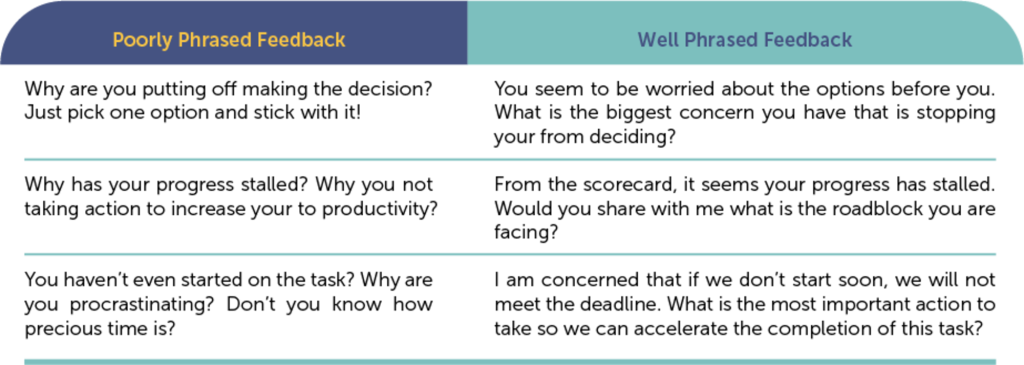

Feedback is the Breakfast of Champions.
– Ken Blanchard

When feedback is given this way, the coach acts as a mirror. In this way, the coachee is shown their current status, what level of performance they are now in, and what improvements they can make. By guiding people to discover what is in front, feedback becomes a valuable tool in your coaching conversations.
The question to ask then is “How do coaches give effective feedback?” It all boils down to intent. When the intention is clear and pure to want the best for the other person, the likelihood of success is higher. Conversely, if the intention is to belittle and humiliate the other person, then the possibility of failure increases. To get a better idea, reflect on the following examples on giving feedback about someone who has the habit of procrastinating.

As seen in the examples, feedback followed by a question helps the coachee identify the solutions to the issues before them. Give them time to process and reflect given, then guide the conversation with powerful questions to trigger their creative mind so they can think of what they can do to resolve the problems they face.
Ben, the general manager of a logistics company, suddenly asked feedback about his relationship with the direct reports during a coaching conversation. Taking this opportunity to add value to the session, the coach first got Ben to be held accountable to the feedback that was solicited from others at an earlier time.


Remember no one can make you feel inferior without your consent.
– Eleanor Roosevelt

“I highly appreciate your wanting feedback on your performance. Before giving you the feedback, what is your commitment to take the feedback openly and work on the areas that make sense to you?” the coach asked.
Upon getting a positive response, the coach shared with Ben the feedback gathered. After listening to what the coach shared, Ben felt he was on the right track. The feedback signaled that he was on the right track, and provided information on areas for improvement. The coach meanwhile, ensured the feedback given was done in a warm and diplomatic manner without assigning blame or surfacing criticism.
Now, what about the times when coaches received feedback from the coachee, how should the coach react? Remember that feedback is a two-way street, if the coach can give feedback, then the coachee is allowed to do so too.
Upon receiving feedback, a good coach automatically adopts the mindset that the feedback is coming from a good place. With this mental attitude, the coach is open to improve their coaching skills by listening intently to what is said, and to ask questions to get a better understanding of what gaps may need to be close. As a coach, you would want to thank the person who gave the feedback and offer your appreciation. Respond to the feedback given by making improvements where necessary, and use the feedback to your advantage to continuously become a better coach.
![]()
Watch #1 Strategic Innovation Coach and ITD World CEO Dr Peter Chee shares how he influenced a senior executive who was resistant to transform to receive feedback from his team that enable positive transformation. You can watch the full story when you enroll in the CCMP program today.

![]()
Top leaders worldwide are sharpening their edge with coaching mastery for differentiated leadership outcomes. Discover how the globally recognized Certified Chief Master Coach (CCMC) journey equips senior decision-makers across industries to drive transformation and results.
15 July | 🕗 8AM NY / 8PM SG
✅ Explore business + human outcomes
✅ Discover competencies that enables impact
✅ Hear stories of those who have walked the journey
🎁 Plus: Get a chance to win an exclusive coaching session with a
global coaching guru worth USD 11,180!
Join this exclusive, complimentary preview. Your next level of leadership starts here!
Join leaders, industry captains, and experts around the world at the at the 52nd ARTDO Conference from July 27-29, 2025, at the E&O Hotel in the historic city of George Town, Penang, Malaysia.
This conference brings together some of the best thought leaders to share their insights, wisdom, and best practices to drive competitive advantage for you and your organization.
Focusing on the theme of High Performance Organizations with Talent Acceleration, Coaching Culture & Digital Leadership, they’ll be sharing actionable strategies to enable results in a digital world.
Register now and we’ll be in touch and get ready to lead with confidence into the future!